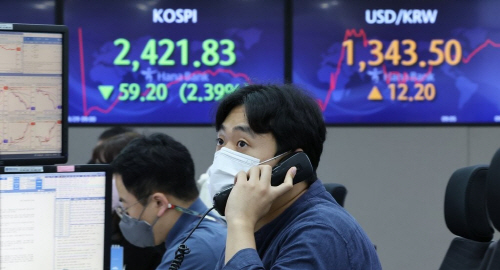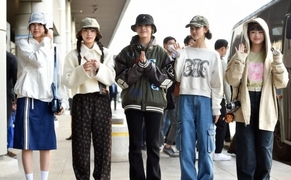 |
AsiaToday reporter Oh Kyung-hee
The South Korean financial market tumbled after U.S. Fed Chairman Jerome Powell made hawkish remarks at the U.S. central bank’s annual Jackson Hole meeting on Friday. The KOSPI and KOSDAQ plunged Monday more than 2 percent, and the South Korean currency sank below the 1,350 level against the US dollar for the first time in more than 13 years.
According to the Korea Exchange, the country’s main stock index KOSPI plunged 54.14 points, or 2.18 percent, to close at 2,426.89. The tech-heavy KOSDAQ also plummeted, losing 22.56 points, or 2.81 percent, to end at 779.89.
Selling by domestic institutions led the downtrend. In the stock market, institutions and foreign investors sold 558.7 billion won and 46.3 billion worth of shares, respectively. On the other hand, individuals bought 60.2 billion won worth. In the KOSDAQ market, institutions net sold 159.8 billion won, while individuals and foreigners net bought 102.3 billion won and 67.1 billion won, respectively.
The KOSPI market went down markedly across the board. Samsung Electronics lost 2.33 percent, and No. 2 chipmaker SK hynix went down 2.73 percent. Naver and Kakao shed 3.31 percent and 5 percent, respectively.
The exchange rate soared. In the Seoul foreign exchange market, the won-dollar exchange rate closed at 1,350.4 won, up 19.1 won from the previous trading day. It is the first time the won-dollar exchange rate surpassed 1,350 won to the dollar since April 29 of 2009, when it hit 1,357.5 won.
The fluctuation of the country’s financial market came following the U.S. Fed’s indication of further aggressive key rate hikes due to the Fed Chair Jerome Powell’s hawkish remarks. “Restoring price stability will likely require maintaining a restrictive policy stance for some time,” Powell said Friday at the Jackson Hole meeting. “A single month’s improvement falls far short of what [Fed policymakers] will need to see before we are confident that inflation is moving down,” he said. Market observers saw his remarks as a willingness to keep interest rates at a high level for a certain period of time. If interest rates in the U.S. are higher, investment in the emerging South Korean market becomes less attractive, and foreign investors are more likely to withdraw their funds.
“Fed Chair Powell’s hardline and hawkish remarks at the Jackson Hole meeting increased volatility in the stock market,” said Lee Kyung-min, an analyst at Daishin Securities. “Powell stressed the willingness to continue raising interest rate and that the US Fed will use their tools forcefully to combat the nation’s high inflation.”
As the financial market fluctuated, the country’s top financial watchdog began to check risks. “We need to prepare more thoroughly to respond to heightened uncertainty and protect financial consumers,” Gov. Lee Bok-hyun of the Financial Supervisory Service (FSS) said at an emergency agency meeting Monday. “We plan to support the private sector to make it easier to procure foreign currency by using overseas government bonds held by domestic financial companies,” he said.
#South Korean won #dollar #exchange rate
Copyright by Asiatoday
Most Read
-
1
-
2
-
3
-
4
-
5
-
6
-
7





















